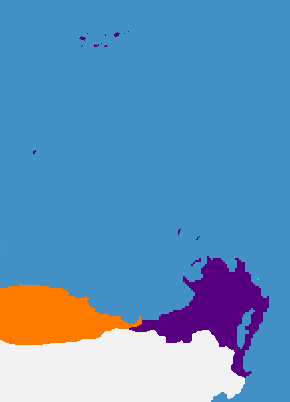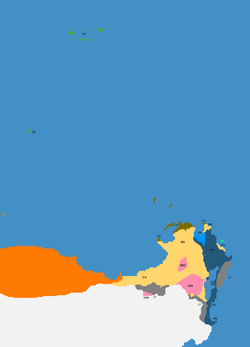Mathral: Difference between revisions
Posadastan (talk | contribs) No edit summary |
Posadastan (talk | contribs) |
||
| Line 71: | Line 71: | ||
=Geography & Climate= | =Geography & Climate= | ||
===Climate=== | |||
Most of Mathral is home to a rather cold climate, with some coastal areas and the Bohwa Islands being slightly more temperate, often being of Cfc and Csc classifications. Meanwhile much of the non-coastal mainland is home to a vast semi-arid to arid steppe environments (BSk & BWk), home to a great many historically nomadic groups. Then through the heartlands and much of the East, there is a Dfb to Dfc climate, where it is rather humid and coniferous, but also quite cold. | Most of Mathral is home to a rather cold climate, with some coastal areas and the Bohwa Islands being slightly more temperate, often being of Cfc and Csc classifications. Meanwhile much of the non-coastal mainland is home to a vast semi-arid to arid steppe environments (BSk & BWk), home to a great many historically nomadic groups. Then through the heartlands and much of the East, there is a Dfb to Dfc climate, where it is rather humid and coniferous, but also quite cold. | ||
| Line 77: | Line 78: | ||
Many large mountain ranges also line the eastern coast and areas surrounding the Lake Mvānye, as well as the southern reaches of the border, much of it being classified as sparsely inhabited tundra (ET). Because of this, much of the population is centered around coastal regions, or the Csc areas, where summers tend to be dry and cold, with summertime temperatures rarely exceeding 15 Celsius and winter temperatures rarely dipping below 0 Celsius, giving a good stability to the weather of those regions. | Many large mountain ranges also line the eastern coast and areas surrounding the Lake Mvānye, as well as the southern reaches of the border, much of it being classified as sparsely inhabited tundra (ET). Because of this, much of the population is centered around coastal regions, or the Csc areas, where summers tend to be dry and cold, with summertime temperatures rarely exceeding 15 Celsius and winter temperatures rarely dipping below 0 Celsius, giving a good stability to the weather of those regions. | ||
===Nature=== | |||
<gallery> | |||
Baluchitherium, The Largest Land mammal at Pakistan Museum of Natural History (PMNH).JPG|Life-sized model of the Ba Honhařa, the largest land animal on Telrova. | |||
Elasmotherium sib1225.jpg|A Wooly Mathrali Rhino sketch, only around 200 still exist in the wild. | |||
Rusingoryx drinking.png|The Ba Mvānye, or Mvanye Beast. | |||
</gallery> | |||
=Government & Politics= | =Government & Politics= | ||
Revision as of 16:56, 17 July 2024
This article is incomplete because it is pending further input from participants, or it is a work-in-progress by one author. Please comment on this article's talk page to share your input, comments and questions. Note: To contribute to this article, you may need to seek help from the author(s) of this page. |
Federal Republic of Mathral Rhebaboliki ya Feterale ya Mathral | |
|---|---|
|
Flag | |
| Motto: In Unity and Liberty! | |
 Map of Mathral | |
| Capital and largest city | Hochōborha |
| Official languages | Mathrali |
| Religion | 48% Christian 26% Atheist 21% Folk 5% Other |
| Demonym(s) | Mathrali, Momathral |
| Government | Federal multiparty parliamentary republic with an executive presidency |
• President | Bomo Nchatinya |
• Vice-President | Tsisi Kokonhwa |
• Parliament Speaker | Vantu Tsokwane |
| Legislature | Parliament |
| Establishment | |
| Area | |
• Total | 791,607.3 km2 (305,641.3 sq mi) |
| Population | |
• 2025 census | 9,107,400 |
• Density | 11.5/km2 (29.8/sq mi) |
| GDP (PPP) | estimate |
• Total | $177.29B |
• Per capita | $19,467 |
| GDP (nominal) | estimate |
• Total | $81.08B |
• Per capita | $8,903 |
| HDI (2025) | 0.743 high |
| Time zone | UTC+03:00 (PST) |
| Date format | dd/mm/yyyy |
| Driving side | right |
| Calling code | +212 |
| Internet TLD | .ml |
Mathral, or the Federal Republic of Mathral, is a small, isolated republic on the southern continent of Kaniq in Telrova. With its cold climate, rolling steppes and snowcapped mountains, the sparse population, centered primarily around a few coastal cities and islands, is made up primarily of indigenous Mathrali citizens, along with a mixture of neighboring and colonizing ethnic groups. It is notable for being one of a few countries in Telrova to have a tricameral system of governance as well.
The nation is bordered to the west by the Kingdom of Bathelonat and is bordered at sea by an island belonging to Socialist Platypus. The country is well-renowned for its landscapes and multicultural society. It is also one of the most sparsely populated countries on all of Telrova, with only 11.5 people per square kilometer (29.8 per sqmi).
The nation also enjoys relative stability, having an unbroken chain of democracy since it was freed from colonial rule in 19XX, and having few regional rivalries, with the exception of a dispute of the Tachinya Island with neighboring Bathelonat. It is defended by the Mathrali Defense Forces and has neutrality enshrined into its constitution.
Etymology
History
Geography & Climate
Climate
Most of Mathral is home to a rather cold climate, with some coastal areas and the Bohwa Islands being slightly more temperate, often being of Cfc and Csc classifications. Meanwhile much of the non-coastal mainland is home to a vast semi-arid to arid steppe environments (BSk & BWk), home to a great many historically nomadic groups. Then through the heartlands and much of the East, there is a Dfb to Dfc climate, where it is rather humid and coniferous, but also quite cold.
Many large mountain ranges also line the eastern coast and areas surrounding the Lake Mvānye, as well as the southern reaches of the border, much of it being classified as sparsely inhabited tundra (ET). Because of this, much of the population is centered around coastal regions, or the Csc areas, where summers tend to be dry and cold, with summertime temperatures rarely exceeding 15 Celsius and winter temperatures rarely dipping below 0 Celsius, giving a good stability to the weather of those regions.
Nature
Government & Politics
Infrastructure
Economy
Demographics
Culture & Society
See Also




